What happens when two university admissions counsellors decide to bring their passion for Southern style and access to education together? Well, if you ask Steven and Jason, they'll tell you an online store that sells hand-crafted bow ties and two entrepreneurs who just ran their first successful pop-up store inside a trendy women's boutique in Mississippi.
This case study walks you through the journey of two friends and their quest to run a side business while using a portion of their proceeds to help students out with scholarships for school. From coming up with a concept, going through the search for manufacturers, setting up their online storefront, to what it takes to run a pop-up, these two have a lot of great tidbits and insight to share.
Whether its using pop-ups shops to add another sales channel or using them as a way to increase brand awareness, The Good South, is a testament to why the trend is here to stay and why every ecommerce entrepreneur should consider giving them a shot.
Let's dive right in.
1) What inspired you to start The Good South?
We both have jobs as admissions counsellors for the University of Mississippi, we shared similar passions, and we love all aspects of Southern culture, especially our style of clothing. We set out on the best way to combine our two greatest passions, style and higher education, and the outcome of that was to open The Good South.
We’re able to sell items that best represent everything we love about the South, bow ties, t-shirts, and hats. In tandem with that, we’re also able to create opportunities for college students through The Good South Scholarship Fund, which is a way to help high school students pay for college through taking a portion of our yearly sales and turning them into scholarships.
2) What was the process like setting up your online storefront?
We knew that being an online store, images were extremely important. It came with a lot of preparation. We had the majority of the verbiage already written. We took a lot of time to plan out a photo shoot and have a photo shoot for our product images because, again, being online, we realized the importance of that. It took a lot of preparation beforehand.
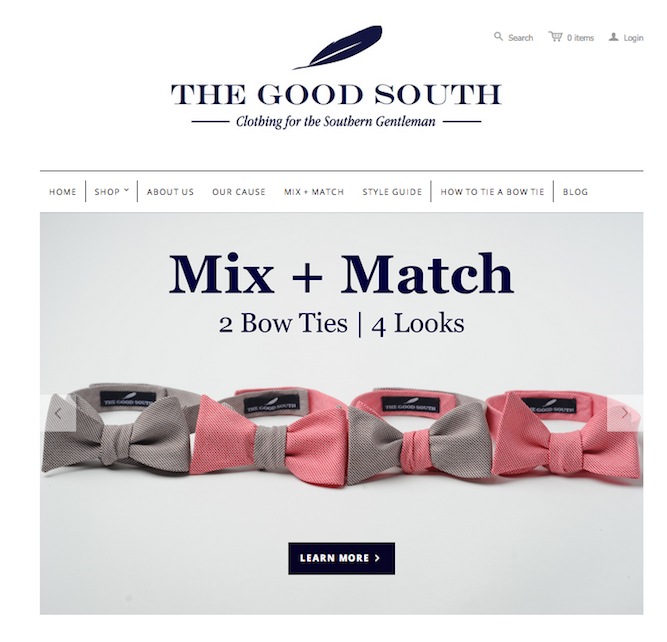
We ended up buying our template through Shopify a few weeks early to go ahead and upload what we could. Then, after the photo shoot we uploaded the pictures. The whole process of purchasing the template and linking our domain name was very simple. We’re not the most technologically advanced people, so we were worried about it, but Shopify ended up being very user friendly.
3) How did you go about designing and manufacturing your products?
We chose the products based on what we considered to be quintessentially Southern. It was also really important for us to design our own bow tie. We wanted to have a say in absolutely everything. Now to be completely honest, we didn’t know how to sew nor did we know much about the fabric industry, so it was a huge learning curve.
We actually worked on the business about two years before we launched in November. We didn’t anticipate working on the business that long before we opened, but we really wanted to make things right and have things exactly the way we wanted before launching.
Our next step was to start sourcing fabric along with a manufacturer. To be honest with you, that process was a lot more more difficult than we anticipated. There is a lot of trial and error, we ended up ordering lots of samples of fabrics and holding them in our hands and seeing if we love them. We only selected fabrics that we loved and ones that we thought our customers would love.
The other thing we found was that it is incredibly difficult to find manufacturers in America. But it was really important for us that our products be made in the South, so we specifically wanted a manufacturer in the South. We put a lot of love into the design of our bow tie, and I know it’s a small article of clothing, but there’s a lot that goes into the construction of a bow tie. It took us months to find a manufacturer that could put as much love into the execution of our bow ties as we put into the design.
3) What was your shipping strategy?
Given that the Good South is something we run in conjunction with our full-time jobs, we primarily end up shipping directly from our office during our lunch hour, and we touch everything. We write a handwritten thank you note to every customer.
However, the other things is that another element in our jobs is that we’re traveling a lot. There are a lot of times when we have to ship something on the road and we have it down to an art now whenever we’re going out of town. We’ll end up packing a certain amount of bow ties and t-shirts and hats into our vans along with our shipping materials, so you can say that we’re a kind of traveling business at times.
4) Why did you decide to do a pop-up shop? What were your goals in doing one?
Well, we knew we wanted to have a pop-up shop, and a lot of it was just kind of due to the fact that we were hearing and seeing “pop-ups” everywhere, also learning about pop-ups through the Shopify blog really inspired us as well. Our goal was really to find a location where having a pop-up shop would benefit us not just in sales, but also in brand awareness.
Luckily for us, we were approached by a women’s boutique and thought that that would be a perfect location. It was a wonderful trendy women’s boutique in Hattiesburg, Mississippi. The store’s called Click. We found that even though our company is marketed towards the Southern gentleman, women account for a large portion of our sales, making purchases for their boyfriends or husbands.
What we loved about the pop-up was that it was such a great opportunity for us to reach out to different markets, and it also allowed us to see our customers interact with our products in person. It can sometimes be difficult, as you know, for a customer to appreciate the quality and of a product when it’s online. Having a pop-up shop allowed our customers a different shopping experience than they normally get with us.
5) What were the details of your agreement with the boutique owners?
We had a dream of a pop-up shop scenario. This boutique contacted us about hosting a pop-up shop in their store, which we immediately agreed to. They ended up clearing out an entire room for us in their store and let us have not only have the space for free, but they actually helped us market the pop-up shop, going so far as to give their customers 20% off of merchandise if they made a purchase with The Good South.
6) What did you do from an interior design and display perspective?
We were also lucky in the fact that our pop-up shop was about two hours from our office. We had the opportunity to go and see the physical space beforehand, to see it two weeks beforehand, and one thing about our business, because we have full time day jobs, we plan everything as far in advance as possible. We took pictures and then we started sketching what we would like the shop to look like.
It was, when I say a blank canvas, like we really mean blank canvas. It was completely white. It was very clean, which ended up working out for us in the best possible way.
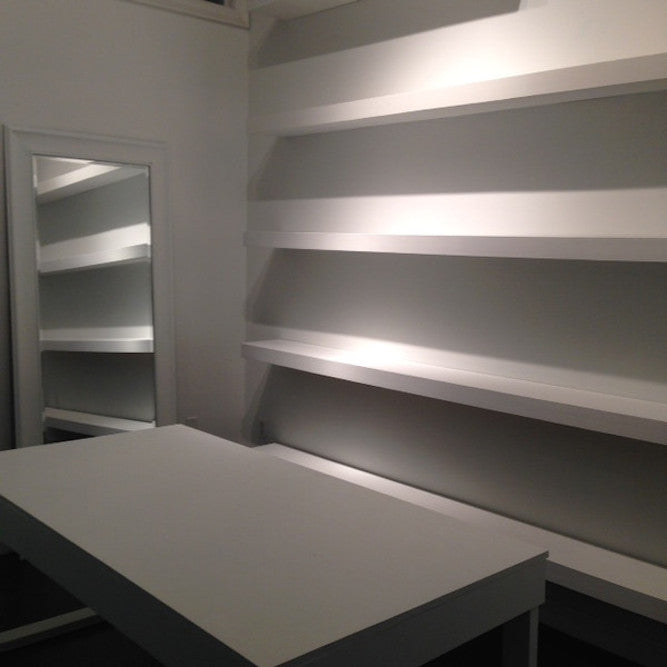
We wanted the space to represent The Good South, so we designed a full wall of shelves, and we immediately knew, this is where our bow ties would really shine through. We built 24 really inexpensive bow tie displays for the wall. The Home Depot actually made the carts for us, and so we didn’t have to cut them, all we had to do was assemble them and then we stained them.
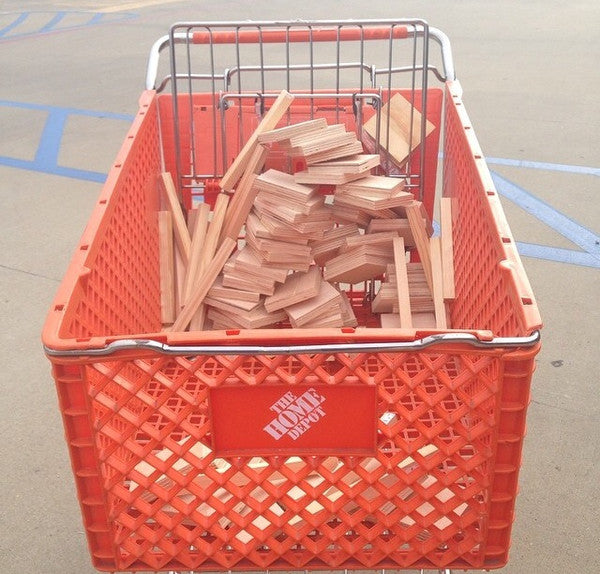
We also had a sign made with our logo on there. It was a pretty large sign. We wanted to do that to distinguish our space from the women’s boutique so that customers realize that they didn’t just carry men’s clothing now, but it was The Good South in the space.
We also brought other decorations that we had from our office, and we wanted to keep everything clean and simple, so we also ended up budgeting very little for the pop-up shop strategically, because we wanted to maximize our profits and really felt that any unnecessary decorations would just take away from our products.
We wanted our products to speak for themselves. The bow tie display, we were really happy with it. It was very clean and simple, but it almost felt like an art gallery.
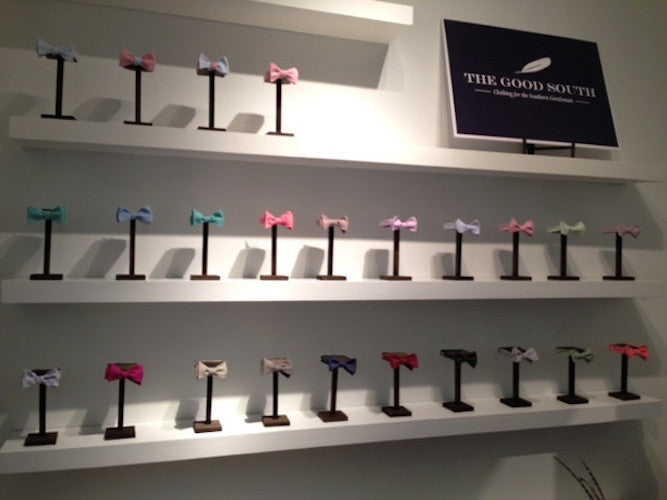
7) What did you do to forecast sales and determine how much inventory to stock for your pop-up?
Since our pop-up was only going to run on a single day, Saturday, from 10:00 to 5:00 PM, we weren’t really exactly sure how many bow ties to bring, so we guesstimated how many we thought we could possibly sell on an unbelievable day and then we even took more. We over packed just in case as we would have hated to miss out on a sale just because we ran out of stock.
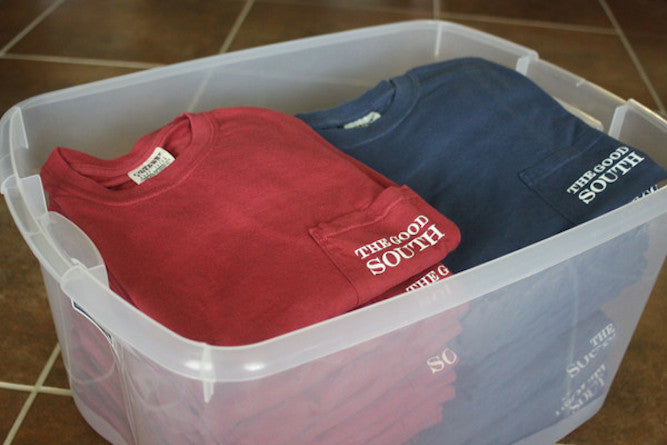
We also over packed a little bit to make the store, the pop-up shop, feel a little fuller, as it was also a great opportunity to take pictures for social media and it was great to be able to see our products in a store on a physical shelf in a retail store.
8) How did you promote the pop-up shop?
We did all of our marketing through social media, meaning Facebook, Twitter and Instagram were the vehicles on our end. We promoted the shop on Facebook and everything we did we mentioned Click, the boutique, so that they would know and in turn would be able to cross-promote on their Facebook and their Twitter and their Instagram, and see traffic to their store, too. We also promoted on our blog, and again, the boutique was so great. They not only shared a lot of our stuff and retweeted us but they also made some custom graphics that they posted to their social media account.
They also sent out two emails, the first one was two days before the pop-up shop in which they sent out an email to their entire list to tell their customers that we’d be there, and then another one the day of. We found that that helped a lot. We ended up gaining a lot of social media followers that week and we also noticed an increase in our website hits, which made the whole pop-up experience very positive and encouraging.
9) How did you evaluate your pop-up shop’s success?
We actually had a record number of daily sales that day. Not to mention that we gained quite a few followers to our social media accounts through the cross-promotion with Click. That’s really important because that stays with you. We have the opportunity now to reach out to those new followers, through actively engaging with them to motivate them to buy in the future.
Another thing that came up through this is that Click also saw an uptick in sales that day and have said that they would like to do some other things with us in the future, which is really great. A few of the customers who came in during our pop-up were also other boutique owners who expressed interest in wanting to purchase from us wholesale, so those relationships were a big bonus for us too.
10) What advice would you give to other ecommerce entrepreneurs looking to do a pop-up shop?
The first thing that we would advise is to be open to change, because you never know what’s going to happen. We planned and sketched and brought in some more props, so to speak, for our space. We put them into places that we thought looked good on the sketch pad, but we had to maybe get rid of something that looked better on a drawing than in the actual store. You never really know what’s going to happen or what’s going to be best for you. It’s a lot of trial and error.
The other tip would be to just do it, go for it 100% , and have a pop-up shop. Find a spot that’s a good fit for your brand and one that makes sense, and then plan for it, and prepare for it. That’s our motto for everything. We plan, plan, plan as much as we possibly can, in advance, and we planned and we then we worked strategically on the pop-up shop for two weeks, and I think all that served us well. We weren’t frazzled going into it, even though it was our first time, and we had a game plan, as we knew exactly where and how we wanted the entire section to be laid out.
One last thing, you don’t have to spend a lot of money to do a pop-up shop. We made our displays for a very, very inexpensive amount, and they were completely DIY. We also had the sign made very cheaply. It really doesn’t have to cost an arm and a leg to do a pop-up shop. It can be intimidating to do it, so that’s why our biggest advice would have to be, “Just do it.” Pop-up shops take a bit of preparation, but they certainly don’t have to be expensive.
(Image Credits: The Good South)
P.S. Liked this post? You'll love The Ultimate Guide to Pop-Up Shops and How to Create a Successful Pop-Up Shop.
P.P.S. Looking to pop-up? Check out Shopify POS.
Read more
- Early to Market: How Curiosity Helped This 3D Printing Service Find Success
- Selling Anywhere: How These Retailers Built a Community With Multichannel Sales
- How Two Fashion Designers Used a Pop-Up Shop to Build Their Brand and Better Understand Their Customers
- How This Canadian Footwear Brand Is Finding Success Focusing on Heritage and Style
- How One Disruptive Menswear Brand Transformed a Pop-up Space in SoHo, NY
- How LisolaStore Grew Orders 20% by Unifying Sales Channels with Shopify
- How Oliviers & Co. Grew Revenue 350% by Unifying Online and In-Person Selling
- How a 107-Year-Old Sneaker Company Reinvented Its Business With Omni-Channel Retail
- How PDPAOLA Improved Customer Lifetime Value by Unifying its Customer Data





